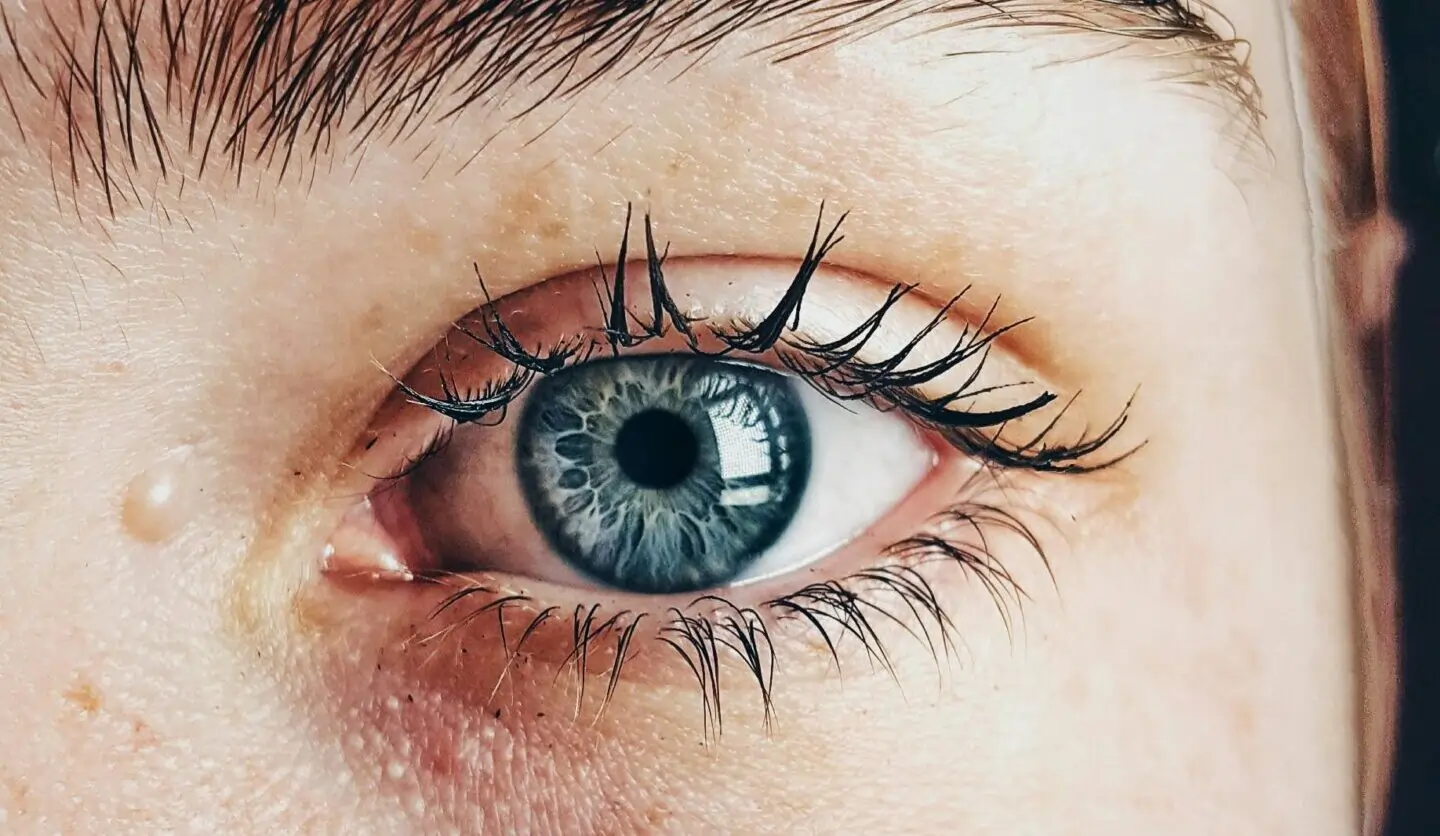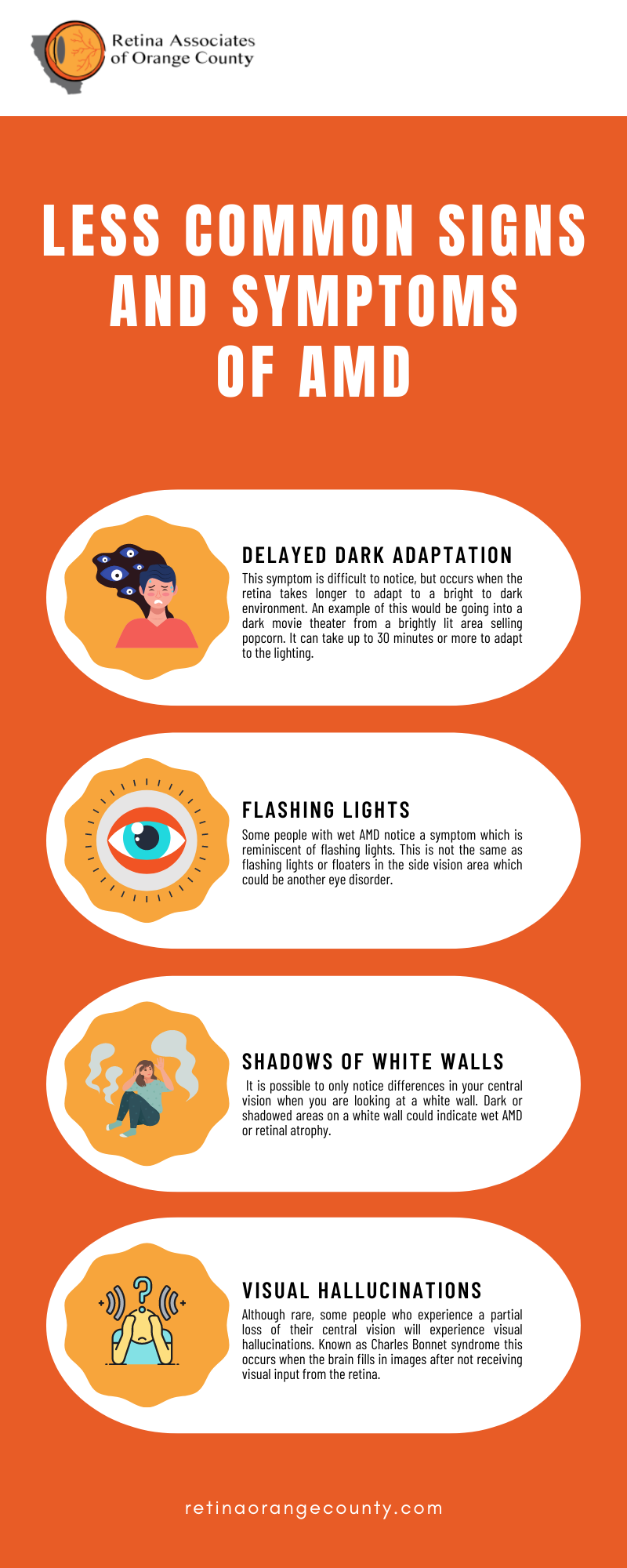Interpreters are Available!
Menu
Menu


At the Retina Associates of Orange County, our team is experienced in taking care of patients who are in need of an Orange County retina specialist. We have been providing quality eye care services for this community and beyond, and hope that you consider booking an appointment for an exam if you are concerned about your eye health. One of the most common reasons that patients walk into our office is due to age related macular degeneration.
Age related macular degeneration, or AMD, is the most common cause of vision problems and vision loss in people over 60 years of age. This eye disease has a direct effect on the retina, which is made up of thin tissue that lines the back of the eye. Inside the center of the retina is the macula. This contains high amounts of cones which are cells sensitive to light. Cones are responsible for providing clear, sharp, and detailed central vision. When AMD is present, the cells within the macula begin to break down and die. This results in distorted central vision and blind spots.
There are two types of AMD: Dry and Wet. People can develop both types of AMD. The dry form of AMD can advance and lead to vision loss without developing into wet AMD. Many people will experience subtle differences in their vision without ever experiencing partial or total vision loss.
Common symptoms of AMD can vary and may include:
Dry AMD typically causes a slight blur, both up close and far away, in the central vision. As the disease progresses, this area can cause fuzzy and shadowed vision eventually leading to blind spots. Some people might also struggle to see fine details and certain colors.
With wet AMD, a person can experience the same signs as dry AMD, but they might also notice that straight lines are appearing wavy. In the severe form of wet AMD, there might be rapid vision loss, sometimes within a few days or weeks. If you are noticing any of the aforementioned signs, please call an AMD specialist immediately.
An Orange County specialist for retina health might tell you that the signs and symptoms of AMD can vary. When only one eye is affected, the individual might not notice any symptoms. Furthermore, there is no pain associated with AMD. In general, it is usually an eye doctor who detects the first signs of the disease prior to any actual symptoms. This is why it is so important to have annual eye exams when you reach the age of 60, or when you begin developing eye problems.
Although most people with AMD will not experience the following signs, it is important to be aware of them beforehand.

Age-related macular degeneration is a leading factor in blindness for people who are 65 years or older. It is estimated that more than 12 million people in America have this condition, and is expected to increase as our population reaches their retirement years. Unfortunately, many people who develop AMD are not diagnosed until around seven years after symptoms for this condition have arisen. While there is no “cure” for it, there are treatments that can slow down the progression.
The treatment for early dry age-related macular degeneration (AMD) is often nutritional therapy, as a healthy diet that is high in antioxidants can support macula cells in the eye. If the condition is at a more advanced stage, higher quantities of specific vitamins and minerals may increase the amount of healthy pigments within the eye cell structure.
Currently, one of the most effective treatments for wet age-related macular degeneration is through injection therapy. The injection solution consists of healthy molecules that support new blood vessel growth. Depending on your case, we may suggest taking certain prescription medications to reduce the intensity of symptoms.
Scientists have recently found that drinking espresso daily in combination with rich fruits and vegetables can have a protective effect on eye health. Consuming coffee can help prevent age-related macular degeneration. Some patients may be suitable for laser photocoagulation surgery, but this may only be appropriate for specific circumstances. Examples of supplements and vitamins that may be taken to help macular degeneration include:
For the most personalized and comprehensive eye care plan, we encourage patients to visit our office. Please do not begin a treatment plan without consulting with an eye doctor first.
If you’ve been experiencing strange squiggles, clouds, or spots in your field of vision, an Orange County retina specialist may be able to help. Read on to learn more about floaters, and see what the professionals at Retina Associates of Orange County can do for you.
If you’ve ever looked at the sky on a sunny day and noticed weird, almost transparent squiggles that go away as soon as you try to focus on them, you don’t have to be alarmed. You’re seeing floaters, and they’re a perfectly natural phenomenon caused by our own eyes.
Our eyes are filled with a gel called the vitreous. As we get older, strands of this gel start to stick together, causing what we perceive as clouds, dots, or little squiggles in our field of vision. It’s partially caused by age, and partially caused by the vitreous slowly detaching from the backs of our eyes over time.
By themselves, floaters aren’t any cause for concern. But sometimes, they can indicate a more serious eye problem. Some eye injuries or infections can cause more floaters to show up, and even if the floaters are unrelated to a more serious eye injury, they can be disruptive and downright dangerous.
While floaters can be a minor annoyance when you’re trying to read, it can be hazardous to be driving a motor vehicle only to have your vision suddenly clouded over by floaters. Fortunately, an eye specialist can help.
If your floaters are causing you too much discomfort, or a dangerous lack of vision, you may have to get in touch with an Orange County retina specialist to schedule a vitrectomy.
As the professionals at Retina Associates of Orange County can explain, it’s always best to learn all you can about any medical procedure before committing the time and energy to an operation. While a vitrectomy is relatively simple, it only makes sense to ask plenty of questions ahead of time. Read on to learn a little more about your vitrectomy, and see how we can help.
A vitrectomy is an outpatient surgery performed under local anesthesia, but it’s not without risks. Vitrectomies involve removing a large amount of the vitreous from your eye, and while it may solve your problem with floaters, it may open you up for other eye conditions such as cataracts, retinal tears, and more.
There are increasing instances of specialized lasers used to target floaters and improve vision, but at the moment there aren’t enough cases to provide solid evidence of their efficacy. If lasers are tested more often, they may be a useful alternative to intensive surgery. Rather than requiring a vitrectomy, eye specialists may be able to use these lasers to break apart your floaters when they become too much of a problem.
When you experience eye trouble that can be traced directly to an issue with your vitreous, your specialist may recommend a vitrectomy. Your eye contains a gel called the vitreous. When we’re born, the gel is firmly attached to the inner-back of the eye. However, as we age, the vitreous slowly dries, shrinking and becoming less attached. This shrinking and drying leads to floaters, and other eye issues that you may need resolved with the help of an Orange County retina specialist.
A vitrectomy involves the complete removal of the vitreous gel inside of your eye. This is carried out by a trained professional under local anesthesia. Before proceeding, your specialist will perform a dilated eye exam. After determining the cause of your vision problems, they can schedule the actual vitrectomy. Fortunately, a vitrectomy is an outpatient procedure, which means you’ll be able to go home on the same day of your operation.
A vitrectomy is a safe and routine procedure, but there are a few risks. In some cases, you may develop cataracts after your vitrectomy, or experience retinal tears or retinal detachment during or after the operation. It’s important to remember that the vitreous serves an essential function in your eyes, and a vitrectomy involves removing the vitreous completely.
Yes. Depending on your case, your eye specialist will replace your vitreous with saline or silicone oil. Before “refilling” your eye, your eye doctor will also take the time to repair any other damage that caused (or was caused) by your damaged vitreous.
Yes, although at the moment these alternative methods are still in their infancy. If you think you’ll need a vitrectomy, there may be options that involve lasers that can break down your floaters – but you may still need a vitrectomy if your floaters are caused by another problem within your eye.
An Orange County retina specialist knows that one of the leading causes of vision loss in adults is macular degeneration. As mentioned above, while this condition does not affect a person’s peripheral vision, it can have an impact on what they see directly in front of them, referred to as central vision.
The good news is that there are steps that you can take that can help prevent macular degeneration. The following are some of the most common. For more details, make sure to contact the Retina Associates of Orange County.
One of the easiest things we can do to protect our eyes is to wear sunglasses that have UV protection. Sun exposure can cause damage to the retinas and this can lead to macular degeneration. Wearing sunglasses every day that have UV protection of at least 400 can help minimize the risk.
Eating healthy and having a balanced diet is beneficial for a myriad of reasons. One of those reasons includes reducing the risk of macular degeneration. Our diets play a pivotal role in the health of our eyes, which is why it is so critical to include fruits and vegetables that contain antioxidants.
Antioxidants reduce oxidative stress. High oxidative stress can damage the macular and this damage is irreversible. Some of the best vegetables to add to your diet are:
Along with a healthy diet, adding multivitamins can help reduce the risk of macular degeneration. If you are at particularly high risk, your Orange County retina specialist may recommend a blend of supplements for you.
When a person has hypertension, the flow of blood to the eyes can be limited because of the poor blood circulation that occurs with this condition. This can actually contribute to macular degeneration. Being overweight can also have an impact since this can also cause high blood pressure.
Study after study has proven just how dangerous smoking is and what kind of damage it does. An Orange County retina specialist knows that smoking can also increase a person’s risk for macular degeneration. Smoking causes dangerous free radicals and unstable molecules which can cause damage to the cells and prevent nutrients from reaching the retina.
Even if you follow all of the above steps, it is important to have comprehensive eye exams on a regular basis. There are no warning signs when a person is developing macular degeneration. This is why it is critical for all adults to obtain a baseline screening for the condition when a person reaches 40 years of age.
According to the National Eye Institute, about 20 million adults in the United States have some form of age-related macular degeneration (AMD). Of those, about 10 million have late AMD, which is the form of AMD that can lead to vision loss. The risk of developing AMD increases with age. About 1 in 10 people aged 50 to 64 have some form of AMD, while about 1 in 3 people age 75 to 85 have some form of AMD.
Floaters are harmless, but they can be hazardous if they’re interfering with your sight, and they can be a sign of a more serious eye condition. If you’re noticing more floaters than usual, or they’re interrupting with your day-to-day activities, you might need to get in touch with a qualified retina specialist.
The right retina specialist can examine your eyes, help you determine the root cause of your floaters, and determine what treatment will be best for you. Get in touch today to get started.
The first thing an eye specialist will do is a dilated eye exam. This involves using special eye drops to dilate your eyes before looking for the floaters in question. In some cases, the specialist will discover the underlying problem behind your floaters. If your floaters aren’t caused by any other condition, your specialist may recommend a vitrectomy.
If you are experiencing any of the aforementioned signs or symptoms of AMD, it is very important to discuss them with an AMD specialist. We can imagine that if you are suffering from any of the above symptoms, that you may be in need of some advice. Aging is something that can feel scared about, but is only a natural stage in life. We offer compassionate and seasoned insight when speaking with patients, and hope to help you or a loved one today. Please schedule an appointment with a retina specialist in Orange County at Retina Associates of Orange County as soon as possible for more information.
At Retina Associates of Orange County, we understand that you need dedicated care and support to restore your vision, and we understand that any operation depends on clear communication before commitment. Reach out to us to learn more about whether or not you need a vitrectomy, and get in touch with us today to schedule an appointment with one of our Orange County retina specialists.
Interpreters are Available!
Posted onTrustindex verifies that the original source of the review is Google. Cannot say enough about the level of expertise and competency of Dr Hwang and his staff. He saved my vision by repairing a detached retina in my right eye and has been providing incredible care in treating my macular condition and retaining my vision over the years. He is caring and compassionate with a true love for his practice. I am blessed to be one of his patients!Posted onTrustindex verifies that the original source of the review is Google. Check up on visual issue went perfectly. Great staff as well.Posted onTrustindex verifies that the original source of the review is Google. Professional and thoughtful doctor, caring patient as a family member.Posted onTrustindex verifies that the original source of the review is Google. Great service. Very satisfied.Posted onTrustindex verifies that the original source of the review is Google. I have tremendous anxiety prior to my intraocular injections to manage my wet AMD, but Dr. Hwang makes the process as quick and painless as possible. I wouldn't trust my eye health to anyone else. He's the best.Posted onTrustindex verifies that the original source of the review is Google. The receptionists are very courteous. Appointments are always on time. Dr. Hwang answers all questions and explains things to you.Posted onTrustindex verifies that the original source of the review is Google. Always good service. Dr. Gupta is first rate.
We are dedicated to delivering compassionate, expert care to patients facing sight-threatening retinal conditions.
